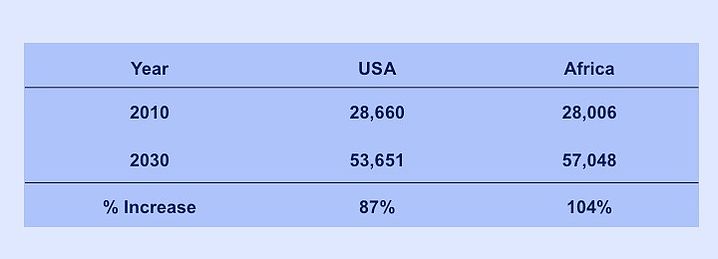
Prostate cancer is the leading cancer in men of Africant descent around the world (Source: MADCaP)
Dana-Farber Cancer Institute has launched a multicenter genetic study of prostate cancer in Sub-Saharan Africa in search of new information about the genetic etiology of prostate cancer. Researchers from eleven institutions in the United States and Africa will look at the genetic susceptibility of prostate cancer in men of African descent. According to statistics received from Dana-Farber Cancer Institute, death from prostate cancer is 2-5 times higher in Blacks compared to whites, 62 Black men out of 100,000 will die of prostate cancer while the number for white men is 25.
The five-year study is funded by the National Cancer Institute and led by principal investigator Timothy Rebbeck, Ph.D., professor of Medical Oncology at the Dana-Farber Cancer Institute and professor of Cancer Epidemiology at Harvard TH Chan School of Public Health.
“Men of African descent suffer disproportionately from prostate cancer compared to men of other races and ethnicities. Our understanding of this disparity is incomplete and we hope to find some of the answers in this study,” said Rebbeck. “Aggressive prostate cancer is the form of the disease that is the most important to control. African descent men, including African Americans, seem to have biologically more aggressive forms of prostate cancer than other groups. By studying African descent men, we may also learn about aggressive prostate cancer so that we can better prevent and treat the disease,” Rebbeck added.
The participating centers are part of a consortium, Men of African Descent and Carcinoma of the Prostate (MADCaP), and include: 37 Military Hospital, Accra, Ghana; Albert Einstein College of Medicine, Bronx, New York; Center for Proteomic & Genomic Research (CPGR) , Cape Town, South Africa; Georgia Institute of Technology, Atlanta, Georgia; Hȏpital Général de Grand Yoff, Dakar, Senegal; Korle-Bu Hospital, Accra Ghana; National Health Laboratory Services, Johannesburg, South Africa; NIH/NCI, Bethesda, Maryland; Stanford Cancer Institute, Stanford, California; Stellenbosch University, Cape Town, South Africa; University College Hospital, Ibadan, Nigeria.

Prostate cancer deaths will increase dramatically in coming decades (Source: MADCaP)
MADCaP has a three-fold mission; to improve prevention and treatment of prostate cancer in men of African descent, undertake research that will improve understanding of carcinoma of the prostate in all men, and foster global partnerships for prostate cancer research around the world. The goal of the consortium is to undertake research that is both impactful and sustainable through the work of local researchers.
According to statistics from MADCaP, prostate cancer is the leading cancer in men of African descent globally. The consortium believes that much can be learned by focusing on prostate cancer research in Africa and the Caribbean. Research can yield information on the unique exposures, genomics and risk factors and the ability to relate the disease in Africa to understand the disease in the Diaspora. By looking at ways to improve prostate research, detection and prevention in Africa and the Caribbean, MADCaP sees the benefit to the population in terms of security, economic development and social development.
The Data Coordinating Center at Dana-Farber will play an important role in this study as the data coordinating center for all of the institutions. The grant is funded by the NCI, grant number U01-CA184374.
Dana-Farber sits at the center of a wide range of collaborative efforts to reduce the burden of cancer through scientific inquiry, clinical care, education, community engagement, and advocacy. Dana-Farber/Brigham and Women’s Cancer Center provides the latest in cancer care for adults; Dana-Farber/Boston Children's Cancer and Blood Disorders Center for children. The Dana-Farber/Harvard Cancer Center unites the cancer research efforts of five Harvard academic medical centers and two graduate schools, while Dana-Farber Community Cancer Care provides high quality cancer treatment in communities outside Boston’s Longwood Medical Area.

today in black history
April 26, 2024
South Africa held its first all-race election in 1996, with almost 23 million voters casting ballots over four days.
Prostate Cancer Study of Black Men
POSTED: March 28, 2016, 10:30 am













